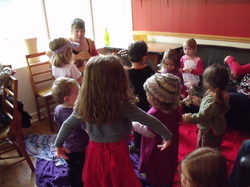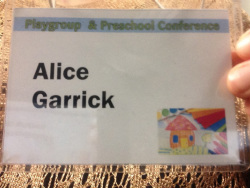
Hi everyone, as you might have noticed, I'm very keen on using music to support kids emotionally. I've often talked about how to do that as a parent but even in groups setting music can be so much more than just a fun activity to get kids moving or to transition to a different activity. Music can't be rivalled as a way to connect with kids in a group setting and here are some of my ideas on why you should make the most of it:
Music can change a child's world and make a world of difference when working with the Under 5s
Music is a brilliant tool for connecting and reconnecting with children. When working with children in a group setting, finding opportunities to really connect and build relationships with each child can be tricky as we are often working to maintain the focus of the whole group or gently guiding group dynamics and practicing ‘crowd control’.
When working with under 5s, we are working with children who are just at the beginning of negotiating social interactions and they need a lot of guidance and support. Young babies and toddlers haven’t yet reached the developmental stage of ‘playing together’ and will play alongside each other and struggle with the influence other children can have on their play. Pre-schoolers are making rapid developments in understanding their own autonomy and expressing themselves and also need plenty of hands on guidance in interacting and cooperating. All under 5s need a lot of support with using communal toys and materials and the conflicts that come up with sharing. Sometimes we can feel run off our feet just putting out fires and managing behaviour. If we hope to do more than, if we seek to find room to support these children as they learn from these social experiences and develop emotionally, we need a relationship and mutual connection with each child to work from.
Our role as a group facilitators is a busy one and at times it can seem difficult to take the time to connect to children individually and observe and support their emotional needs. Music is often used as part of group activities with children but when we keep in mind how valuable this music time can be for connecting and building relationships, we can really be mindful of making the most of it.
Music is a fun and connecting experience for children and their caregivers. Being silly and lowering our inhibitions or shyness while singing and moving to music brings down barriers between people. Finding a place of relaxed connection sets us up to have a point of reference later, it opens a connection between a child and a caregiver and creates a platform from which we can later reference that emotional connection. To be able to help a child remember a place of emotional connection and find refuge in it gives us a huge head start and a place to build from when trying to support a child that is feeling alienated and upset. Without a place of connection to start with, reaching that child can be very difficult and we end up with children unsupported and falling through the cracks.
Interacting with children through music is a place where we can observe their interaction style, whether they like to hang back a bit or if they're right up front, and meet them where they are at. We can notice if a child is not engaging and change the dynamic of the music session to be more inclusive. By noticing children's individual ways of connecting, the different intensity levels each child needs and making room for that child to feel included and have these needs validated we are setting up and environment where a child is more likely to feel safe from feeling overwhelmed or threatened. Engaging though music offers us another opportunity to show children that we can see their individual needs and that we care about them. Making eye contact, drawing each child in to the experience, in the way that makes them feel understood and not just jollied along is another way letting a child know that they can trust us with their vulnerability and their feelings. Later, when issues come up for a child and we need to step in to help resolve a conflict, we have a better chance of emotionally supporting a child and finding a happy resolution if we have already demonstrated that we care about their feelings. In having those experiences of connection through music, later when conflict arises, the relationship is there to catch the struggling child the child.
Taking the opportunity to remember that music time is a time for connecting we can turn it from a process of leading a group to one of connecting with each child, in a group setting. Spending a few minutes interacting to music, being silly, making eye contact, just being together really helps build connections. Taking the sharp edges off caregiver/child interactions and creating opportunity for reconnection are the small but incredibly important differences that can nourish relationships and help us raise confident, secure, happy children.
(c) Alice Garrick

 RSS Feed
RSS Feed
